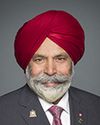It's great that you support each other so well.
We deal with some incredible subjects at this committee, and we hear some incredible testimony. The testimony we heard today and previously on this subject was really moving.
This committee hears things. We just wish that all Canadians could sit in on this committee sometimes, and hear about opioid addictions, pharmaceutical issues, and Alzheimer's disease issues. We'd probably have a much different approach to health issues if everybody could hear what we hear.
The first line responders, the paramedics, and the firefighters who land on the scene quite often, to hear their testimony, it's incredible.
Anyway, we thank you very much.
Actually, I just want to blow my own horn here a little bit. Years ago, and Mr. Nicholson might remember, I had a private member's bill to develop a brain tumour registry in Canada. There was no registry; there were no records. Doctors couldn't compare situations across the country. That was a private member's bill that passed, as yours hopefully will. It's quite gratifying to have that happen.
Thank you very much for your testimony.
We're going to take a break, and then we're going to do clause-by-clause study, and see if we can complete this.
Thank you.








